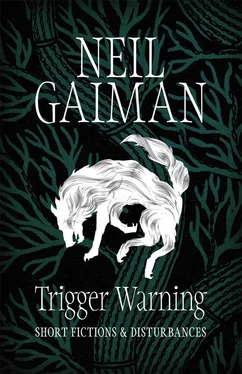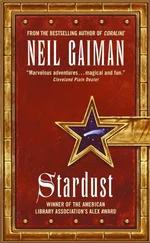Neil Gaiman - Trigger Warning - Short Fictions and Disturbances
Здесь есть возможность читать онлайн «Neil Gaiman - Trigger Warning - Short Fictions and Disturbances» весь текст электронной книги совершенно бесплатно (целиком полную версию без сокращений). В некоторых случаях можно слушать аудио, скачать через торрент в формате fb2 и присутствует краткое содержание. Год выпуска: 2015, Издательство: Headline, Жанр: Старинная литература, на английском языке. Описание произведения, (предисловие) а так же отзывы посетителей доступны на портале библиотеки ЛибКат.
- Название:Trigger Warning: Short Fictions and Disturbances
- Автор:
- Издательство:Headline
- Жанр:
- Год:2015
- ISBN:нет данных
- Рейтинг книги:4 / 5. Голосов: 1
-
Избранное:Добавить в избранное
- Отзывы:
-
Ваша оценка:
- 80
- 1
- 2
- 3
- 4
- 5
Trigger Warning: Short Fictions and Disturbances: краткое содержание, описание и аннотация
Предлагаем к чтению аннотацию, описание, краткое содержание или предисловие (зависит от того, что написал сам автор книги «Trigger Warning: Short Fictions and Disturbances»). Если вы не нашли необходимую информацию о книге — напишите в комментариях, мы постараемся отыскать её.
Trigger Warning: Short Fictions and Disturbances — читать онлайн бесплатно полную книгу (весь текст) целиком
Ниже представлен текст книги, разбитый по страницам. Система сохранения места последней прочитанной страницы, позволяет с удобством читать онлайн бесплатно книгу «Trigger Warning: Short Fictions and Disturbances», без необходимости каждый раз заново искать на чём Вы остановились. Поставьте закладку, и сможете в любой момент перейти на страницу, на которой закончили чтение.
Интервал:
Закладка:
I have taken our discussion of this afternoon to heart, considered it carefully, and am prepared to modify my previous opinions.
I am amenable to your publishing your account of the incidents of 1903, specifically of the final case before my retirement, under the following condition.
In addition to the usual changes that you would make to disguise actual people and places, I would suggest that you replace the entire scenario we encountered (I speak of Professor Presbury’s garden. I shall not write of it further here) with monkey glands, or some such extract from the testes of an ape or lemur, sent by some foreign mystery-man. Perhaps the monkey-extract could have the effect of making Professor Presbury move like an ape – he could be some kind of ‘creeping man’, perhaps? – or possibly make him able to clamber up the sides of buildings and up trees. Perhaps he could grow a tail, but this might be too fanciful even for you, Watson, although no more fanciful than many of the rococo additions you have made in your histories to otherwise humdrum events in my life and work.
In addition, I have written the following speech, to be delivered by myself, at the end of your narrative. Please make certain that something much like this is there, in which I inveigh against living too long, and the foolish urges that push foolish people to do foolish things to prolong their foolish lives.
There is a very real danger to humanity. If one could live forever, if youth were simply there for the taking, that the material, the sensual, the worldly would all prolong their worthless lives. The spiritual would not avoid the call to something higher. It would be the survival of the least fit. What sort of cesspool may not our poor world become?
Something along those lines, I fancy, would set my mind at rest.
Let me see the finished article, please, before you submit it to be published.
I remain, old friend, your most obedient servant,
Sherlock Holmes
***
They reached Old Gao’s bees late in the afternoon. The beehives were grey wooden boxes piled behind a structure so simple it could barely be called a shack. Four posts, a roof, and hangings of oiled cloth that served to keep out the worst of the spring rains and the summer storms. A small charcoal brazier served for warmth, if you placed a blanket over it and yourself, and to cook upon; a wooden pallet in the centre of the structure, with an ancient ceramic pillow, served as a bed on the occasions that Old Gao slept up on the mountainside with the bees, particularly in the autumn, when he harvested most of the honey. There was little enough of it compared to the output of his cousin’s hives, but it was enough that he would sometimes spend two or three days waiting for the comb that he had crushed and stirred into a slurry to drain through the cloth into the buckets and pots that he had carried up the mountainside. He would melt the remainder, the sticky wax and bits of pollen and dirt and bee slurry, in a pot, to extract the beeswax, and he would give the sweet water back to the bees. Then he would carry the honey and the wax blocks down the hill to the village to sell.
He showed the barbarian stranger the eleven hives, watched impassively as the stranger put on a veil and opened a hive, examining first the bees, then the contents of a brood box, and finally the queen, through his magnifying glass. He showed no fear, no discomfort: in everything he did the stranger’s movements were gentle and slow, and he was not stung, nor did he crush or hurt a single bee. This impressed Old Gao. He had assumed that barbarians were inscrutable, unreadable, mysterious creatures, but this man seemed overjoyed to have encountered Gao’s bees. His eyes were shining.
Old Gao fired up the brazier, to boil some water. Long before the charcoal was hot, however, the stranger had removed from his bag a contraption of glass and metal. He had filled the upper half of it with water from the stream, lit a flame, and soon a kettleful of water was steaming and bubbling. Then the stranger took two tin mugs from his bag, and some green tea leaves wrapped in paper, and dropped the leaves into the mug, and poured on the water.
It was the finest tea that Old Gao had ever drunk: better by far than his cousin’s tea. They drank it cross-legged on the floor.
‘I would like to stay here for the summer, in this house,’ said the stranger.
‘Here? This is not even a house,’ said Old Gao. ‘Stay down in the village. Widow Zhang has a room.’
‘I will stay here,’ said the stranger. ‘Also I would like to rent one of your beehives.’
Old Gao had not laughed in years. There were those in the village who would have thought such a thing impossible. But still, he laughed then, a guffaw of surprise and amusement that seemed to have been jerked out of him.
‘I am serious,’ said the stranger. He placed four silver coins on the ground between them. Old Gao had not seen where he got them from: three silver Mexican pesos, a coin that had become popular in China years before, and a large silver yuan. It was as much money as Old Gao might see in a year of selling honey. ‘For this money,’ said the stranger, ‘I would like someone to bring me food: every three days should suffice.’
Old Gao said nothing. He finished his tea and stood up. He pushed through the oiled cloth to the clearing high on the hillside. He walked over to the eleven hives: each consisted of two brood boxes with one, two, three or, in one case, even four boxes above that. He took the stranger to the hive with four boxes above it, each box filled with frames of comb.
‘This hive is yours,’ he said.
***
They were plant extracts. That was obvious. They worked, in their way, for a limited time, but they were also extremely poisonous. But watching poor Professor Presbury during those final days – his skin, his eyes, his gait – had convinced me that he had not been on entirely the wrong path.
I took his case of seeds, of pods, of roots, and of dried extracts and I thought. I pondered. I cogitated. I reflected. It was an intellectual problem, and could be solved, as my old maths tutor had always sought to demonstrate to me, by intellect.
They were plant extracts, and they were lethal.
Methods I used to render them nonlethal rendered them quite ineffective.
It was not a three-pipe problem. I suspect it was something approaching a three-hundred-pipe problem before I hit upon an initial idea – a notion perhaps – of a way of processing the plants that might allow them to be ingested by human beings.
It was not a line of investigation that could easily be followed in Baker Street. So it was, in the autumn of 1903, that I moved to Sussex, and spent the winter reading every book and pamphlet and monograph so far published, I fancy, upon the care and keeping of bees. And so it was that in early April of 1904, armed only with theoretical knowledge, I took delivery from a local farmer of my first package of bees.
I wonder, sometimes, that Watson did not suspect anything. Then again, Watson’s glorious obtuseness has never ceased to surprise me, and sometimes, indeed, I had relied upon it. Still, he knew what I was like when I had no work to occupy my mind, no case to solve. He knew my lassitude, my black moods when I had no case to occupy me.
So how could he believe that I had truly retired? He knew my methods.
Indeed, Watson was there when I took receipt of my first bees. He watched, from a safe distance, as I poured the bees from the package into the empty, waiting hive, like slow, gently humming treacle.
He saw my excitement, and he saw nothing.
And the years passed, and we watched the Empire crumble, we watched the government unable to govern, we watched those poor heroic boys sent to the trenches of Flanders to die, all these things confirmed me in my opinions. I was not doing the right thing. I was doing the only thing.
Читать дальшеИнтервал:
Закладка:
Похожие книги на «Trigger Warning: Short Fictions and Disturbances»
Представляем Вашему вниманию похожие книги на «Trigger Warning: Short Fictions and Disturbances» списком для выбора. Мы отобрали схожую по названию и смыслу литературу в надежде предоставить читателям больше вариантов отыскать новые, интересные, ещё непрочитанные произведения.
Обсуждение, отзывы о книге «Trigger Warning: Short Fictions and Disturbances» и просто собственные мнения читателей. Оставьте ваши комментарии, напишите, что Вы думаете о произведении, его смысле или главных героях. Укажите что конкретно понравилось, а что нет, и почему Вы так считаете.







